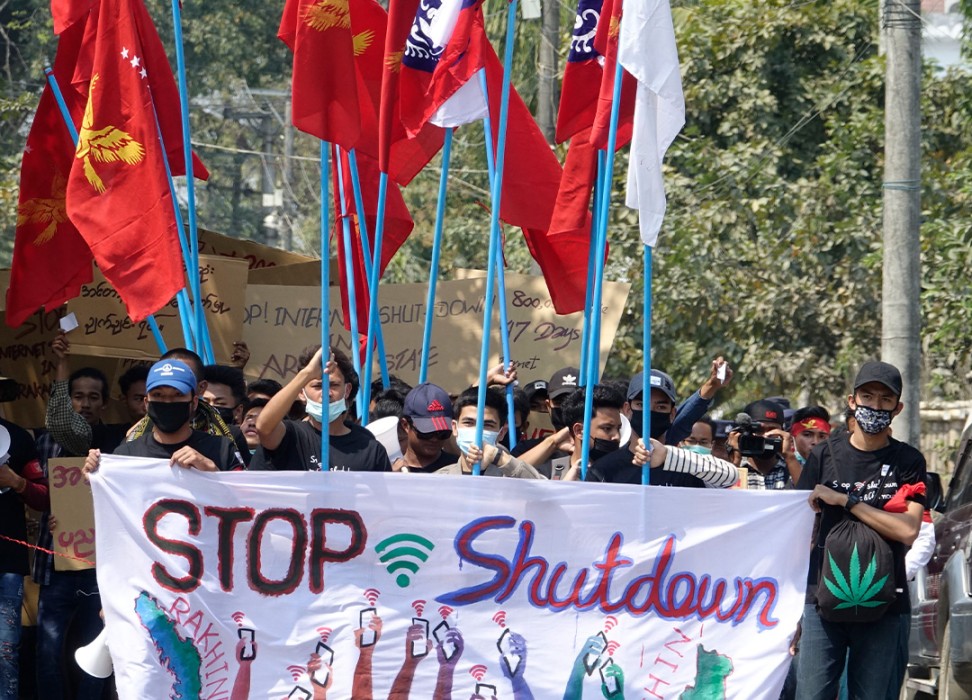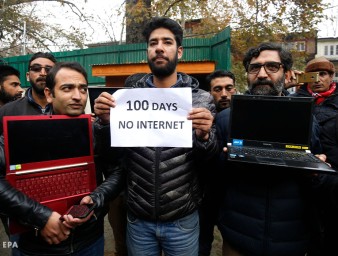Switching off the internet causes incalculable damage: UN report
27 June 2022

A hospital unable to contact a doctor for emergency surgery. Voters deprived of information about candidates during an election. Students missing entry exams for academic programs. Atrocities in conflict zones covered up.
These are just a few examples of the profound damage to the daily lives and human rights of millions of people caused by government-imposed internet shutdowns, a new report of the UN Human Rights Office warns.
The report, Internet shutdowns: Trends, causes, legal implications and impacts on a range of human rights, aims to shed light on internet shutdowns, examining how they undermine a range of human rights, first and foremost the right to freedom of expression. It details how shutdowns undermine development and how some governments increasingly use the measure to stop protests and silence dissent.
“While internet shutdowns deeply affect many human rights, they most immediately impact freedom of expression and access to information – one of the foundations of free and democratic societies and an indispensable condition for the full development of the person,” the report states.
As digitalization advances in societies, the impact of internet shutdowns on people’s lives will increase, the report adds, bearing heavy costs on jobs, education, health, standard of living, political participation and social and cultural life.
“Internet shutdowns have emerged as the digital world has become ever more important, indeed essential, for the realization of many human rights. Switching off the Internet causes incalculable damage, both in material and human rights terms,” said UN High Commissioner for Human Rights Michelle Bachelet.
States should therefore refrain from shutting down the internet, the report urges.
Affected Elections
The report notes that the #KeepItOn coalition, which monitors shutdowns across the world, documented 931 shutdowns between 2016 and 2021 in 74 countries, with some countries blocking communications repeatedly and over long periods of time. Globally, all regions experienced multiple shutdowns, but the majority reported occurred in Asia and Africa.
The report adds that almost half of all shutdowns recorded by civil society groups in the last six years were carried out during protests and heightened political tensions to quell demonstrations on a vast range of social, political and economic grievances.
Shutdowns affected at least 52 elections between 2016 and 2021. In 2019 alone, the governments of 14 African countries disrupted access to the internet during electoral periods.
This was the case in Zambia, which held presidential elections in August 2021 under hurriedly passed cyberlaws to restrict internet, said Susan Mwape, founder and executive director of Common Cause Zambia, an organization that seeks to promote citizen participation.
Mwape said services such as WhatsApp, Twitter, Facebook and Instagram were affected, with the consequence of undermining access to digital tools critical for campaigning and promoting public discussion.
“The cyberlaws were meant to weaponize internet and shut down those vocal against the government,” Mwape said.
“
“
UN High Commissioner for Human Rights Michelle Bachelet
The report points out that shutdowns have evolved from complete blackouts to more targeted disruptions, made possible by new digital tools and surveillance technologies. Governments increasingly resort to “throttling” of bandwidth, or limiting mobile service to 2G, which hinders meaningful use of the internet.
Raya Sharbain of the Jordan Open Source Association (JOSA), a nonprofit organization that advances digital rights in Jordan, said some countries that enforce controls on freedom of expression use vaguely formulated laws to restrict communications and often do not inform the public on the interventions they implement.
“Shutdowns can be difficult to detect – we receive complaints that communications are slowing down during a protest and have to conduct a technical analysis to identify which services are being affected,” Sharbain said.
Humanitarian work and atrocities
The report also gives examples of the impact of internet shutdowns on humanitarian work. In Somalia, aid workers reported that internet shutdowns hampered life-saving humanitarian assistance. In Myanmar, shutdowns endangered local aid organizations.
In conflict-affected areas, blocked access to digital tools that are used to document and report abuses may have contributed to further violence, including atrocities, the report states. Some shutdowns may have been implemented with the deliberate intent of covering up human rights violations, it adds.
Because of the increasing reliance of businesses and trade on digital technologies, disruptions of communications services have serious repercussions on the economy, undermining the flow of remittances and pushing start-ups to ruin, the report points out. The World Bank recently calculated that Internet shutdowns in Myanmar alone had cost nearly $2.8 billion between February and December 2021, reversing economic progress made over the previous decade.
Shutdowns and the way forward
The report addresses the ways companies, development cooperation agencies and civil society can help making it harder for shutdowns to keep occurring.
Stopping internet shutdowns needs to be thought of as an essential ingredient of the global efforts to close the digital divide, the report points out.
One key step to end shutdowns is ensuring greater visibility when and while they happen. The report points to the need for better real-time information on different types of shutdowns, and recommends establishing a collaborative mechanism to gather information on disruptions.



